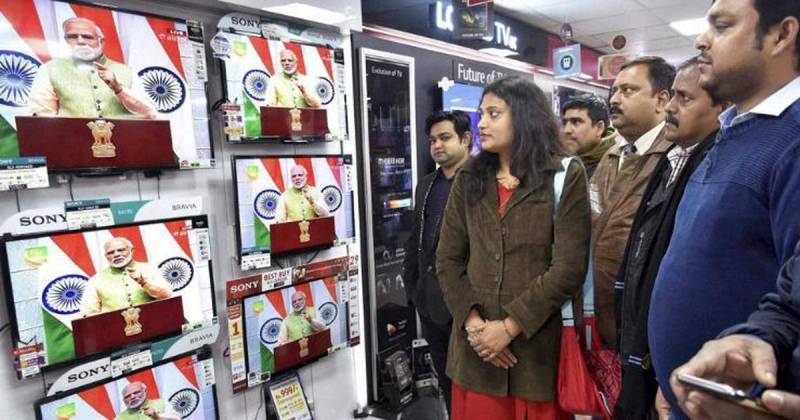
Media in India cheers, when New Delhi abuses power, The Economist said in an article which discussed the revocation of Article 370 and clampdown in Indian-held Kashmir. “Kashmiris are demonised, the Indian authorities praised.”
The Modi government scrapped Jammu and Kashmir’s constitutional autonomy, ended its status as a state and divided it into two parts, without consulting the region’s 12 million-odd inhabitants or after a national discussion or even the semblance of a proper parliamentary debate, The Economist noted.
“As Pratap Bhanu Mehta, a public intellectual, puts it, the act of supposedly integrating the former state more fully into India has begun by casting the mostly Muslim inhabitants of the Kashmir valley ‘under a pall of suspicion’. Kashmiris’ first experience of Indian law as a union territory, he notes, is of untrammelled executive power.”
Talking about the emergency imposed by Indira Gandhi in 1975, it mentioned BJP leader Lal Krishna Advani who told journalists at that time: “You were asked only to bend, yet you crawled.”
Today, far from crawling, India’s press and television channels are jumping up and down and cheering.
It cited the example of CNN News18 polling viewers on whether Shehla Rashid – the co-founder of a recently launched mainstream party in Jammu and Kashmir and a leader of the main student union at Jawaharlal Nehru University – should be arrested. “Her crime? She claimed that the army had tortured detainees in Kashmir, relaying the screams by loudspeaker to intimidate locals.”
And reporting on what is really going on in Kashmir is hard. Foreign journalists are hindered from going there. The Kashmiri press is stymied from getting its story out. It is only thanks to brave Kashmiri and other Indian journalists filing for foreign news outlets that any picture at all of the benighted region is possible.
The Indian press’s current sycophancy rises from a hinterland of intimidation, trimming and currying favour dating back to Modi’s rise to national power in 2014. Government ads are pulled in retaliation against newspapers that have been critical of the BJP, such as the Hindu and the Telegraph.
Similarly, businessmen are shyer of voicing criticism in public. Ramachandra Guha, a historian, talks of the “silence of the successful”.
Back in 2015 Advani, no fan of Mr Modi, said that he wouldn’t be surprised if, sooner rather than later, another emergency was declared. That remains wild conjecture. But one thing is for sure: the press will be ready.
The Modi government scrapped Jammu and Kashmir’s constitutional autonomy, ended its status as a state and divided it into two parts, without consulting the region’s 12 million-odd inhabitants or after a national discussion or even the semblance of a proper parliamentary debate, The Economist noted.
“As Pratap Bhanu Mehta, a public intellectual, puts it, the act of supposedly integrating the former state more fully into India has begun by casting the mostly Muslim inhabitants of the Kashmir valley ‘under a pall of suspicion’. Kashmiris’ first experience of Indian law as a union territory, he notes, is of untrammelled executive power.”
Talking about the emergency imposed by Indira Gandhi in 1975, it mentioned BJP leader Lal Krishna Advani who told journalists at that time: “You were asked only to bend, yet you crawled.”
Today, far from crawling, India’s press and television channels are jumping up and down and cheering.
Also read: Indian Media Is BJP’s Propaganda Machine: Nandita Das
It cited the example of CNN News18 polling viewers on whether Shehla Rashid – the co-founder of a recently launched mainstream party in Jammu and Kashmir and a leader of the main student union at Jawaharlal Nehru University – should be arrested. “Her crime? She claimed that the army had tortured detainees in Kashmir, relaying the screams by loudspeaker to intimidate locals.”
And reporting on what is really going on in Kashmir is hard. Foreign journalists are hindered from going there. The Kashmiri press is stymied from getting its story out. It is only thanks to brave Kashmiri and other Indian journalists filing for foreign news outlets that any picture at all of the benighted region is possible.
The Indian press’s current sycophancy rises from a hinterland of intimidation, trimming and currying favour dating back to Modi’s rise to national power in 2014. Government ads are pulled in retaliation against newspapers that have been critical of the BJP, such as the Hindu and the Telegraph.
Similarly, businessmen are shyer of voicing criticism in public. Ramachandra Guha, a historian, talks of the “silence of the successful”.
Back in 2015 Advani, no fan of Mr Modi, said that he wouldn’t be surprised if, sooner rather than later, another emergency was declared. That remains wild conjecture. But one thing is for sure: the press will be ready.
